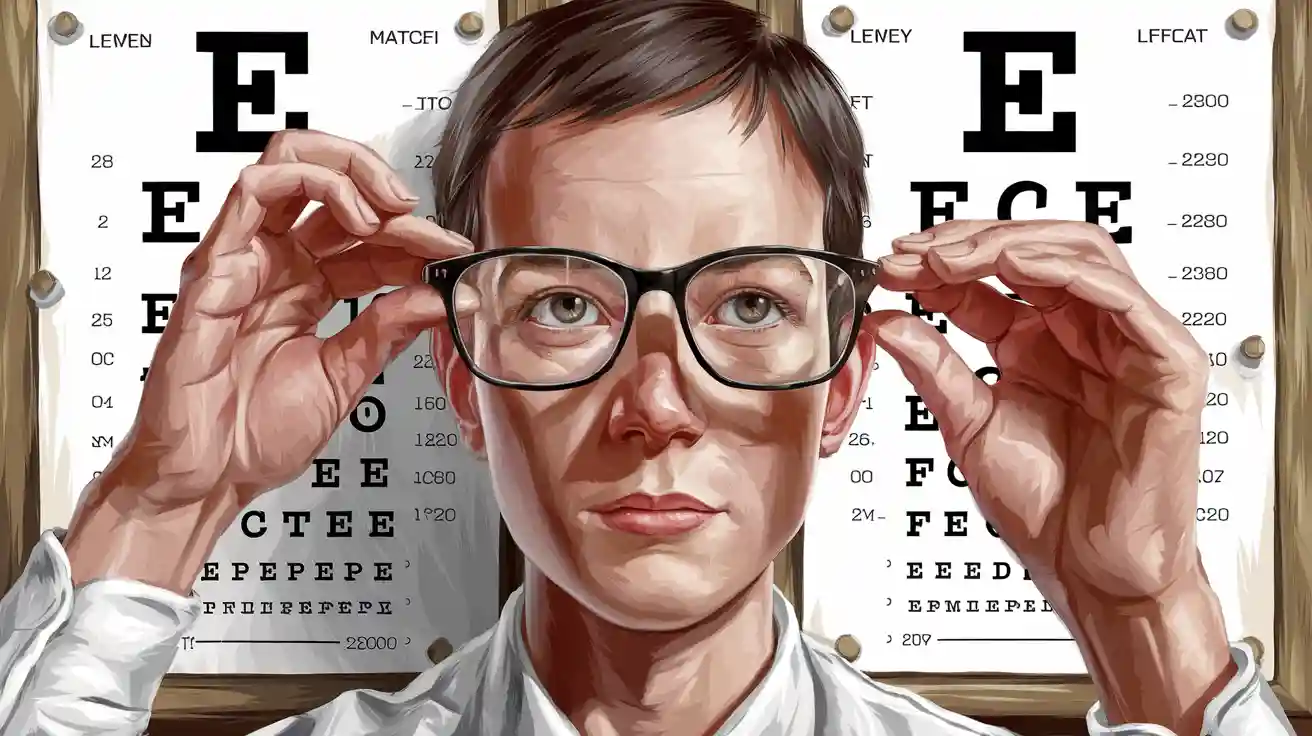
You might wonder, "Do glasses worsen eyesight?" The answer is simple: glasses do not harm your eyesight. Glasses help you see clearly, support your eye health, and never make your eyesight worse. Changes in eyesight often come from natural growth or aging, not from wearing glasses. In fact, over 240 million adults in the U.S. use some form of eyewear, showing how common and helpful glasses are for daily life. Glasses protect your eyes and prevent strain. Many people start using glasses between ages 18 and 21, which highlights the importance of using the right prescription for your eye needs.
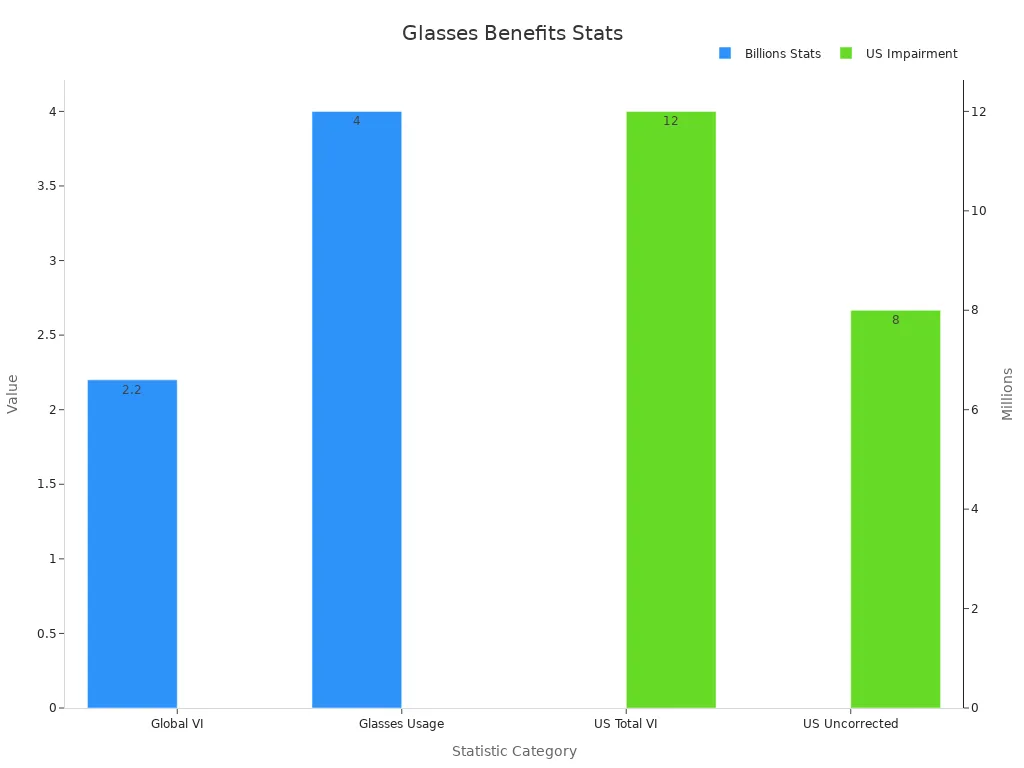
Key Takeaways
Glasses do not harm your eyesight; they help you see clearly and reduce eye strain.
Vision changes happen naturally with age and growth, not because of wearing glasses.
Wearing the correct prescription prevents headaches, eye fatigue, and helps your eyes work better.
Regular eye exams keep your prescription accurate and protect your eye health.
Glasses improve daily life by making tasks easier and supporting overall vision comfort.
Do Glasses Worsen Eyesight
Vision Changes Over Time
Many people ask, "Do glasses worsen eyesight?" This question comes from a common misconception. You might notice your vision changing as you get older and wonder if wearing glasses causes this. The truth is, vision changes happen naturally. Your eyes grow and age, just like the rest of your body. These changes can lead to refractive errors such as nearsightedness or farsightedness.
You may hear stories about deteriorating eyesight after starting to wear glasses. However, scientific studies show that glasses do not cause vision to get worse. A review of research, including studies from the 19th century, found that wearing glasses does not lead to worsening vision. Instead, refractive errors develop on their own, and glasses simply help you see clearly. In fact, a long-term study followed people with myopia for 23 years. The results showed that those who wore the correct prescription had slower progression of myopia than those who did not. By adulthood, everyone with myopia needed glasses to see well, but wearing glasses did not cause any extra deterioration.
You might also worry about age-related eye conditions. For example, a study on age-related macular degeneration tracked patients for over four years. The study found that vision loss happened as a natural part of aging. The rate of vision decline matched the growth of atrophy in the eye, not the use of glasses. This means that wearing glasses does not cause worsening vision or deterioration. Your eyesight changes because of natural processes, not because you use glasses.
"Near vision diminishes for everyone at some point after age 40. Readers prevent eye strain, not changes in your eyes, so go ahead and wear them. 'You don’t get more dependent on the glasses; you see better,' Taylor says."
Wearing Glasses and Eye Health
You may have heard the misconception that wearing glasses weakens your eyes or makes you dependent on them. This idea is not true. Glasses do not make your eyes lazy or cause any harm. Instead, they correct your vision and help your eyes work better. Medical experts explain that refractive errors, like myopia, progress naturally over time. Wearing glasses does not cause your eyesight to get worse. In fact, using the right prescription can reduce eye strain and help you feel more comfortable.
If you avoid wearing glasses when you need them, you might experience headaches, tired eyes, or trouble focusing. Children who do not wear their prescribed glasses may even see their myopia progress faster. Glasses help prevent these problems by allowing your eyes to focus properly. Not wearing glasses can lead to unnecessary eye strain and fatigue.
Wearing glasses as prescribed does not worsen vision or cause eye disease. In fact, not wearing needed glasses can lead to eye strain and fatigue. Using glasses reduces eye strain and promotes overall eye health by allowing the eyes to function properly without unnecessary stress.
You may wonder about other ways to protect your eyes. Regular eye exams help you keep your prescription up to date and catch any changes early. Healthy habits, such as eating nutritious foods and protecting your eyes from bright light, also support good vision.
Here is a table that addresses some common misconceptions about glasses and eyesight:
Myth or Concern |
Expert Explanation |
|---|---|
Glasses cause eyesight to worsen or increase dependency |
Glasses correct refractive errors without deteriorating vision; natural aging or eye conditions cause vision changes independently of glasses use. |
Wearing glasses weakens eyes |
Glasses improve vision and prevent strain; they do not weaken eyes or cause dependency. |
Not wearing prescribed glasses can accelerate vision problems |
Especially in children, neglecting glasses can worsen myopia progression or other vision issues. |
Importance of correct prescription |
Incorrect prescriptions cause strain and discomfort; regular eye exams ensure proper fit and eye health maintenance. |
You can trust that wearing glasses helps your eyes. Glasses do not cause deterioration or worsening vision. They support your eyesight and help you see the world more clearly.
Why People Need Glasses
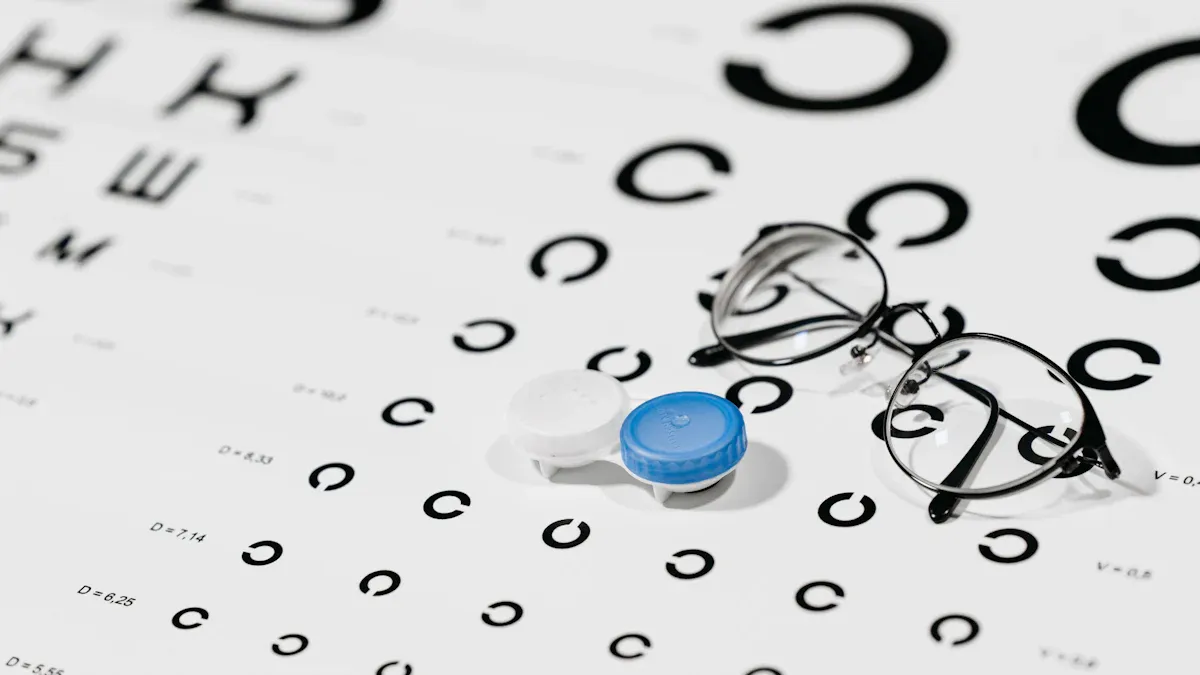
Common Vision Problems
You may notice that your eyes do not always focus well. Many people experience visual problems like blurry vision, trouble seeing far away, or difficulty reading up close. These issues often come from refractive errors. Your eyes might be nearsighted, farsighted, or have astigmatism. Glasses help correct refractive errors and allow you to see clearly.
Vision problems affect people of all ages. In fact, large studies show that more than a quarter of adults over 35 have trouble with near vision, mostly due to presbyopia. Women face these challenges more often than men. As you get older, your eyes change, and you may need corrective glasses to improve eyesight. Without proper vision correction, you might struggle with daily tasks, reading, or even working.
Here is a table showing how common vision problems are among young people:
Statistic Description |
Percentage / Rate (%) |
Additional Notes |
|---|---|---|
Adolescents aged 12-18 reporting wearing corrective lenses |
32.2 |
Based on NHANES data |
Adolescents not wearing corrective lenses with poor vision (20/40 or worse in at least one eye) |
19.6 |
Indicates uncorrected vision problems |
Adolescents wearing corrective lenses and having them available but still with poor vision (20/40 or worse) |
26.9 |
Despite correction, some still have poor distance visual acuity |
Improvement in poor vision after autorefraction correction |
65 |
Reduction in uncorrected poor vision from 19.6% to 6.8% |
Children with poor uncorrected vision showing ametropia |
78.1 |
Based on autorefraction indicating refractive error |
Children wearing corrective lenses but not having them available with poor vision |
76.7 |
Most improved (71.3%) when correction was applied |
Children wearing corrective lenses but not having them available with good vision (20/25 or better) |
12.6 |
Suggests some may be overcorrected or wearing lenses for near vision |
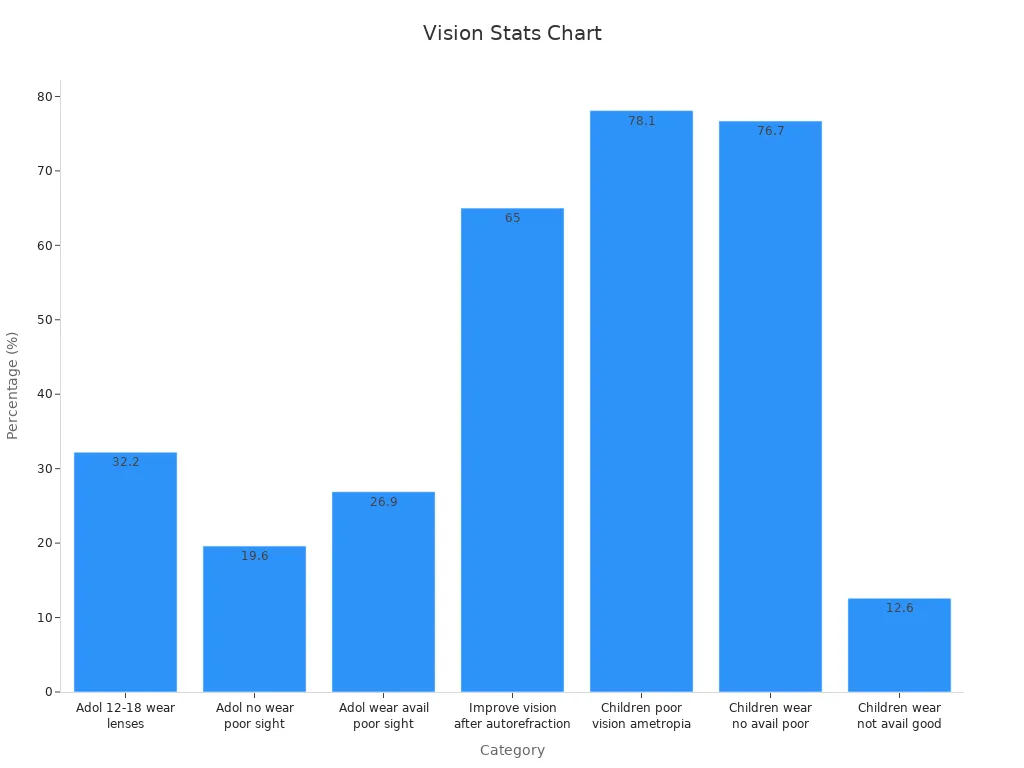
You can see that many children and teens need corrective eyewear. Glasses and lenses play a key role in vision improvement for people of all ages.
Glasses in Daily Life
Glasses do more than just help you see. They make daily life easier and safer. When you wear corrective glasses, you can read menus, scan QR codes, and travel alone with confidence. You can also read documents for work or school without straining your eyes. Glasses help you regain independence and reduce your need for help from others.
Glasses can increase your income, help you return to work, and improve your quality of life. In one study, people who received corrective eyewear saw their monthly income rise by 33%. Many could return to jobs or complete tasks like threading needles and sorting grain.
Here are some ways glasses support your daily routine:
Reading textbooks and preparing lessons if you are a teacher.
Using instant text features to access information quickly.
Asking questions about documents and understanding instructions.
Reducing dependence on others for daily activities.
Glasses also protect your eyes from strain and help you avoid headaches. You can enjoy hobbies, work, and social events with clear vision. When you use the right lenses, you support your eye health and improve your overall well-being.
Prescription Matters
Risks of Wrong Prescription
You depend on your glasses and corrective lenses to see clearly. When you use the wrong prescription, your eyes work harder than they should. This extra effort can cause headaches, eye strain, and even dizziness. You might notice blurry vision or trouble focusing. Incorrect lenses force your eye muscles to adjust constantly, which leads to discomfort and fatigue.
Headaches often happen when your eyes try to adapt to new or incorrect prescriptions.
Eye strain, also called asthenopia, can cause itchy eyes, trouble concentrating, and even migraines.
Uncorrected refractive errors like nearsightedness or astigmatism make your eyes overwork, increasing the risk of strain and headaches.
Symptoms such as blurred vision, twitching, and difficulty focusing signal that your prescription may not be accurate.
A 2020 study found that people with the wrong prescription often experience headaches, dizziness, and visual discomfort. Adjusting your prescription for specific tasks, like computer work, can help reduce these problems. Preventive steps, such as following the 20-20-20 rule and reducing screen glare, also help prevent vision deterioration.
Here is a table showing how different types of lenses affect eye strain and headaches:
Outcome |
Effect Size / Risk |
Notes |
|---|---|---|
Eye strain scores: Computer glasses vs. regular glasses |
Small decrease |
Short-term benefit only |
Eye strain: Computer glasses vs. monofocal lenses |
No significant difference |
Long-term results unclear |
Headache risk |
No consistent effect |
Data quality is low |
Severity of eye strain: Individually adapted computer lenses |
Based on one small study |
You need the correct prescription to prevent unnecessary strain and deterioration. Always check that your glasses and corrective lenses match your current needs.
Regular Eye Exams
Regular eye exams help you keep your prescription up to date and maintain vision health. About 11 million Americans over age 12 need vision correction, showing how important these exams are. Early detection and treatment can prevent or delay blindness in most people with diabetes. Many people at high risk for vision loss do not visit an eye doctor each year, which increases the risk of undetected problems.
Children should have at least one eye exam between ages 3 and 5. This helps detect amblyopia, or lazy eye, early. Less than half of preschool children get their vision tested, so many cases go unnoticed. Regular exams help you catch changes in your eyes before they cause discomfort or deterioration.
You should schedule an eye exam every one to two years. Expert optometrists use advanced tools to ensure you get an accurate prescription. This helps you avoid headaches, strain, and other problems linked to incorrect lenses. Keeping your prescription current with regular exams will help you prevent vision deterioration and support your overall eye health.
Benefits of Wearing Glasses
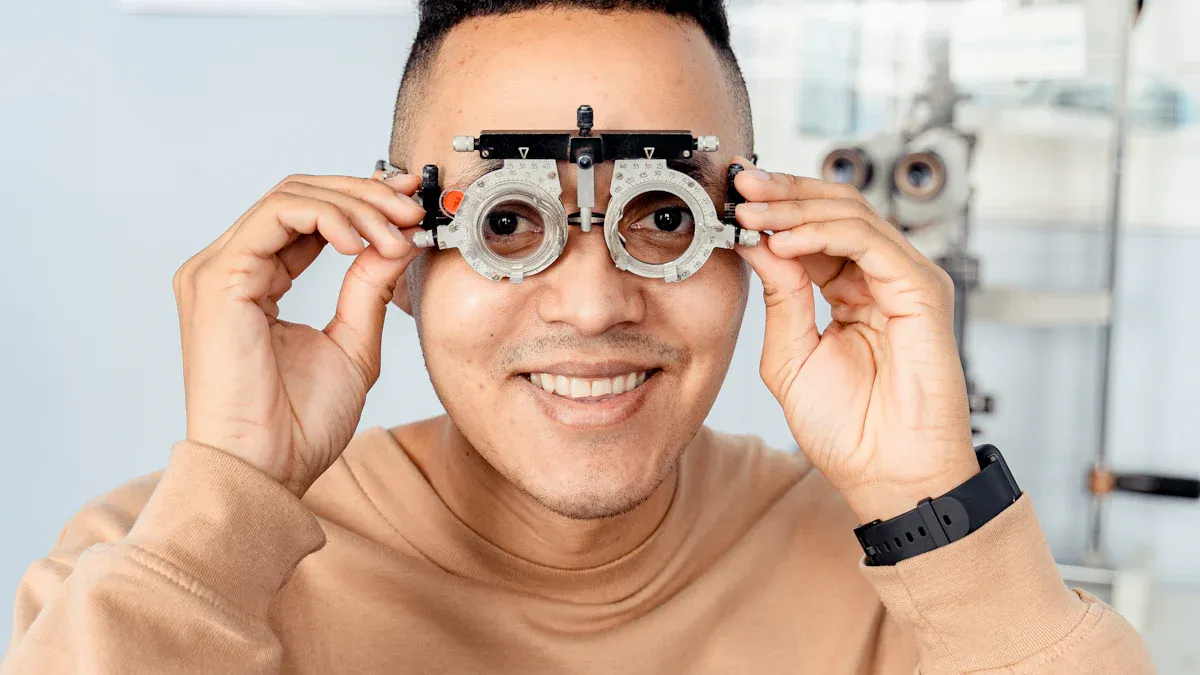
Clearer Vision
You experience the world in a new way when you put on glasses. Glasses help you see objects sharply and read text without squinting. They correct refractive errors like nearsightedness, farsightedness, and astigmatism. When you use corrective lenses, light focuses properly on your retina. This process gives you clear vision and helps you enjoy daily activities with confidence.
Many people notice a big improvement in their lives after getting glasses. You can read books, see the board at school, and recognize faces from a distance. Glasses do not cure your eye problems, but they improve eyesight every time you wear them. Studies show that children who receive vision correction perform better in school and sports. You may also find that wearing glasses helps you feel more comfortable and less tired during the day.
Glasses support vision improvement by making details sharper.
You avoid headaches and fatigue when you use the right lenses.
Vision correction helps you stay independent and active.
Glasses play a key role in vision improvement and quality of life. When you wear glasses, you see the world with more clarity and less effort.
Reduced Eye Strain
You may spend hours looking at screens or reading. Without proper glasses, your eyes work harder to focus, which leads to strain. Wearing glasses with the correct prescription reduces this extra effort. You feel less tired and avoid symptoms like headaches or blurry vision.
Clinical trials have tested different lenses for eye strain from screens. Results show that blue-blocking lenses do not reduce symptoms more than regular lenses. However, using the right corrective lenses for your needs prevents discomfort. You protect your eye health and improve eyesight by reducing strain.
Intervention |
Number of RCTs |
Effect on Eye Strain / Visual Fatigue |
Certainty of Evidence |
Notes |
|---|---|---|---|---|
Blue-blocking spectacles |
3 |
No reduction in visual fatigue |
Low certainty |
No significant symptom improvement |
Multifocal lenses |
3 |
No improvement in visual fatigue |
Not high certainty |
No significant difference vs. single-vision |
Overall |
45 RCTs total |
No high-certainty evidence supporting glasses for eye strain reduction |
- |
No clinical trials show glasses reduce eye strain specifically |
You can still benefit from wearing glasses by preventing eye strain from screens and daily tasks. Glasses help you focus, reduce discomfort, and support vision improvement. When you use corrective lenses, you give your eyes the support they need for clear vision and comfort.
You can trust that glasses support your eyesight and never harm your eyes. Glasses correct refractive errors, letting you see clearly and comfortably. Your eyesight changes naturally as you age, but glasses do not cause these changes. When you wear glasses, you avoid eye strain and headaches. Glasses do not change your eye physically; they only help you while you wear them. Not wearing glasses brings back symptoms like tired eyes. Always keep your prescription current with regular eye exams. Glasses help you enjoy daily life and improve eyesight every day.
Glasses restore vision to 20/20 or better for many people.
Glasses provide clear eyesight and protect your eye health.
Regular eye exams keep your prescription accurate and your eyes healthy. Glasses make life easier and brighter.
FAQ
Do glasses make your eyes dependent on them?
You do not become dependent on glasses. Glasses help you see clearly. Your eyes do not get weaker because you wear them. You can take off your glasses at any time. Your vision returns to its natural state.
Can wearing the wrong prescription harm your eyes?
Wearing the wrong prescription does not damage your eyes. You may feel headaches, eye strain, or blurry vision. You should visit your eye doctor if you notice discomfort. Correct prescriptions help you see better and feel comfortable.
How often should you get your eyes checked?
You should get your eyes checked every one to two years. Children may need more frequent exams. Regular checkups help you keep your prescription up to date and catch any changes early.
Is it safe for children to wear glasses?
Yes, it is safe for children to wear glasses. Glasses help children see clearly and support healthy eye development. You should make sure your child wears the correct prescription.
Do glasses protect your eyes from screens?
Glasses do not block all screen effects. Some lenses have coatings that reduce glare. You should follow the 20-20-20 rule: every 20 minutes, look at something 20 feet away for 20 seconds. This helps reduce eye strain from screens.






